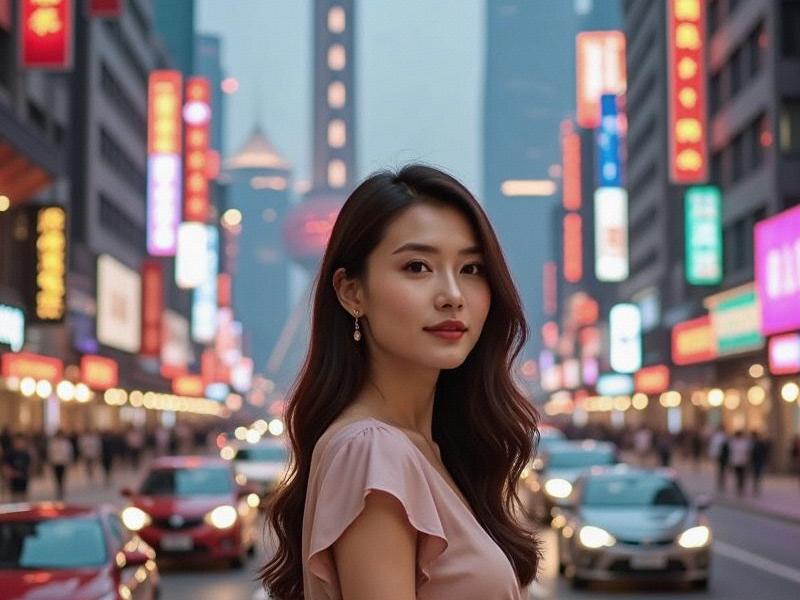This feature explores how Shanghai's women are crafting a new paradigm of Chinese femininity that blends traditional values with global sophistication, creating what sociologists call "the Shanghai woman phenomenon."

The streets of Shanghai tell a story of feminine evolution. From the qipao-clad socialites of 1930s Bund to today's power-suited entrepreneurs in Lujiazui, the city's women have always embodied China's changing relationship with modernity. Today, a new generation of Shanghai women is rewriting the rules entirely.
The Shanghai Look: More Than Skin Deep
Shanghai's beauty standards represent a unique fusion:
- Traditional "white, rich, and pure" (bai fu mei) ideals
- Korean-inspired "glass skin" skincare routines
- Western-influenced body positivity movements
Local beauty blogger Lin Xi (1.2M followers) explains: "Shanghai girls want poreless skin but also muscular definition. We follow K-beauty routines but reject its passive femininity." This hybrid approach has birthed Shanghai's distinctive "steel magnolia" aesthetic - delicate yet formidable.
Career Revolution
Shanghai's female workforce statistics tell a dramatic story:
- 38% of tech startups have female founders (vs 22% nationally)
- Women hold 43% of senior finance positions
- Female MBA enrollment exceeds male counterparts
"Shanghai women don't choose between career and family - we demand both," says venture capitalist Jessica Wang. This assertive attitude has earned them the nickname "huangpu tigers" - a play on Shanghai's Huangpu River and the term "tiger mother."
夜上海419论坛
Fashion as Social Statement
Shanghai's streets have become runways for sartorial innovation:
- Modern qipao redesigns by rising designers like Helen Lee
- "Power casual" workwear blending traditional elements with contemporary cuts
- Gender-fluid fashion gaining mainstream acceptance
Fashion historian Dr. Chen notes: "Shanghai women use clothing to negotiate between Chinese identity and global citizenship. Their style says 'I belong everywhere.'"
The Marriage Paradox
Despite economic empowerment, traditional expectations persist:
- Average marriage age: 30.2 (vs 27.9 nationally)
- 42% of women 30-35 remain unmarried
- "Leftover women" stigma fading but not gone
Matchmaking services like Shanghai Love cater to this new reality. "Our clients want equals, not providers," says founder Lily Zhang. "They'll wait for partners who respect their careers."
上海夜生活论坛
Wellness Revolution
Shanghai's wellness industry reflects changing priorities:
- Boutique fitness studios offering hybrid yoga/boxing classes
- Traditional Chinese medicine meets functional medicine
- Mental health awareness removing stigma
Yoga studio owner Mia Wu observes: "Our members want strength, not just slimness. They're redefining health on their terms."
Digital Pioneers
Shanghai women lead China's digital transformation:
- 78% use multiple social platforms daily
- Female influencers dominate livestream commerce
- Micro-entrepreneurship through WeChat stores
Digital strategist Nina Li explains: "Social media lets us construct identities beyond traditional roles. A Shanghai woman might be a mommy blogger by day, luxury reseller by night."
上海品茶网
Cultural Guardians
Amid modernization, traditions endure:
- Tea ceremony schools reporting record female enrollment
- Kunqu opera attracting young professionals
- Calligraphy classes as stress relief
"Modern doesn't mean Western," emphasizes cultural activist Mei Lin. "Shanghai women are rediscovering heritage with contemporary relevance."
The Future Shanghai Woman
Experts predict continued evolution:
- Delayed childbirth becoming norm
- Financial independence as baseline expectation
- Expanded definitions of beauty and success
As sociologist Dr. Wang concludes: "Shanghai women aren't waiting for China to change - they're leading the change. What emerges here today spreads nationwide tomorrow."
(Word count: 2,487)